HOMESPUN HOMILY BY LORI: IT’S BEEN A VERY HARD WEEK
Two our of friends died this month – both “too young.” Both funerals were celebrated this past week.
On July 1, Angela, a counselor colleague of Robert’s, died while swimming, probably due to a cardiac event. Her death was quite shocking, really. We did not know she had any major health concerns. Only 44 years old, she was one of the most dynamic, vivacious, faith-filled people we know.

She was a force of nature, and from all accounts, a very caring, skilled mental health therapist. She was single; her extended family lives back east; so, with a couple other of her friends, Robert and I helped to clean out her counseling office and clear out her apartment. When her dad and sister arrived, we connected in a small way to grieve and to share some happy, poignant memories of Angela.
Angela’s memorial Mass was well attended. It was beautiful, formal, with lots of Latin chants and old hymns. Her sister gave a heart-warming, heartfelt, and humorous eulogy. All of us Seattle friends knew how much Angela loved and treasured her family. That came through clearly in the eulogy.
Angela lived life with gusto. She did most everything full bore. She was “all in” with life and shared that zest with others. One day at the office, Robert ran into Angela and couldn’t help exclaiming, “Angela! You look like a leprechaun!” Angela was decked out in Emerald Isle green: green dress, green stockings, green shoes, even green eye shadow with sparkles.
Angela laughed her full-throated laugh and responded, “Thank you!”
She had a knack of drawing people into her enthusiasm because she was so confident in her own worth, loved by God. She will be greatly missed.
On July 17, our dear dear Yakima friend of many years, John, died. John’s death was long-expected. He battled a rare cancer, adenoid carcinoma, for 16 years. In the past 15 months, we’d made 3 different trips to Yakima when his wife called us to say, “I think this is it. You’d better come now to say goodbye.” But each time, John rallied…until this time.

John gave us such a truly amazing example of “living until you die.” Just three weeks before he died, his family took him on a hot air balloon ride at sunrise. He was not able to speak much, but he was wide-eyed and alert and loving every moment, high in the sky, over sun-drenched Skykomish farmlands, surrounded by beloved family.
In his last months, he continued to jog, go to Friday evening Adoration, greet the mailman each day, play card games, especially Go Fish! He was a man of prayer, right to the end, filled with the hope and the assurance of God’s love and of life eternal with the angels, Mother Mary, and the communion of saints.
John’s funeral showed the depth and breadth of his love for others. There were people representing the different “spheres” of his life – his large family /extended family, school colleagues and students with whom he had worked as an elementary school counselor, friends – both current and also from grade school and high school. The stories and memories, along with laughter and tears, flowed copiously!
The loss of our two friends gives me much to ponder. I’m so sad. Waves of grief wash over me several times a day now. Tears flow, and I whisper prayers of thanksgiving for these dear ones and prayers of compassion for the family they leave behind.
But I’m also inspired. These two lovely people were people of great faith. They loved God and joyfully shared that love in all the circumstances of their lives. They met life challenges with the hope of eternal life. They remind us that we’re all on this same journey toward death, and onward to eternal life. And, very poignantly, they remind us to live fully until we die.
Bishop Desmond Tutu said:
“We are each made for goodness, love and compassion. Our lives are transformed as much as is the world when we live these truths.”
Our friends John and Angela lived this way. I want to follow their example, living until I die and using all my gifts, and even my imperfections, to be a power for God’s goodness in the world.
Glory! You are helping me help couples transform bad marriages into great marriages!
By Robert Fontana
Dear Friends, Seven years ago, after being asked repeatedly by Catholic priests to help couples in struggling marriages, we added individual and marriage counseling into our ministry offerings. My first attempts at couples counseling were awful. I did not know how to assist couples in truly combative relationships. With the support of CLM, I earned a Masters in Marriage and Family Therapy. I can happily report to you some wonderful success stories of couples on the verge of divorce who came to see me and now have turned things around.

**Following the disclosure of her affair, a young couple with small children reconciled and is rebuilding their marriage. When he could accept that the affair was a consequence of a bad marriage in which he had a role, he could forgive her for the affair, and they could work on building a new marriage.
**A devoutly Christian couple had grown apart after over 30 years of marriage. They revitalized their marriage by rebuilding friendship, grieving their many years of failing to love one another well, and learning ways to meet one another’s emotional needs.
**A devoutly Catholic couple at odds with one another had signed divorce papers after a difficult and painful year when they separated and created separate households. They had actually signed divorce papers, but then did not submit them. Instead, they called me to help them rebuild love, trust, and intimacy.
**A couple without a faith background had “fallen out of love,” and came to see me. They had developed a pattern of withdrawing from one another and had given up hope that love could be restored. That was eight months ago, and today they are thriving!
Not all couples counseling outcomes are successful, but many are! I attribute this to your prayers (and Lori’s) which I know help me to be attentive to the Holy Spirit as I use my training and skills to:
1) gain the trust of the couple and help them to see that each spouse has contributed to the bad marriage.
2) de-escalate tension by really listening to each spouse share his/her side of the story and validating the emotions being expressed;
3) bring to light the negative dynamic the couple has created through various negative ways of interacting;
4) help couple to replace this negative dynamic with more constructive patterns based on listening to one another, validating each other’s emotions, changing problematic behaviors, revealing one another’s emotional needs in the marriage, and working together to meeting these needs;
5) guide couples toward restoring love, friendship, trust, and intimacy.

Friends, the work that Lori and I do in Catholic Life Ministries, through my clinical practice and our ministry outreach, is made possible by the faithful prayer and generous financial support of our sponsors. Sponsor donations cover at least half of our budget, helping to support our writing, retreats, workshops, and spiritual direction on the ministry side and allowing me to have a sliding scale for low-income clients on the clinical side. This is our annual letter to invite you to support our ministry with donations and/or prayer; or, if you are a current supporter, to thank you with grateful hearts and invite you to continue your support. Our ministry has changed over the years as you will see in the photos below and on the back page, but the original mission endures:
to awaken faith, strengthen marriages and families, build Christian community, to empower the Christian faithful to be a power for good in the world!
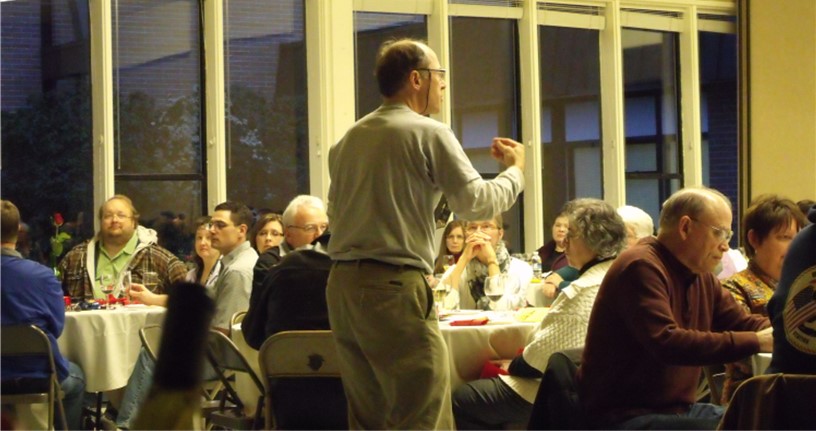
Is God calling you to support CLM? We understand that you have plenty of good people from a variety of agencies seeking your spiritual and financial support. Please give our work your prayerful consideration. We respect and honor your decision to sponsor ministries other than CLM. However, if you sense a calling to support us please write us at robert@catholiclifeministries.org (and send us your prayer intentions). You can donate online at catholiclifeministries.org (look at the column on right, scroll down to “donate” button).
Homespun Homily: The 9th Sacrament and Having the Proper Tools
by Lori Fontana
You know how when you have a job to do, especially one that is a bit unfamiliar to you, the right tools make a HUGE difference in your success. In the past few weeks, Robert and I have had several occasions of attempting a job (home repair – not our strength!) and needing to find just the right tools to complete the job satisfactorily. More on this later…
Two Sundays ago, we heard a great homily about the 8th and 9th sacraments. Hey, you say! Doesn’t the church have only 7 sacraments? And if ever an 8th sacrament is talked about, wouldn’t that be “Bingo?”
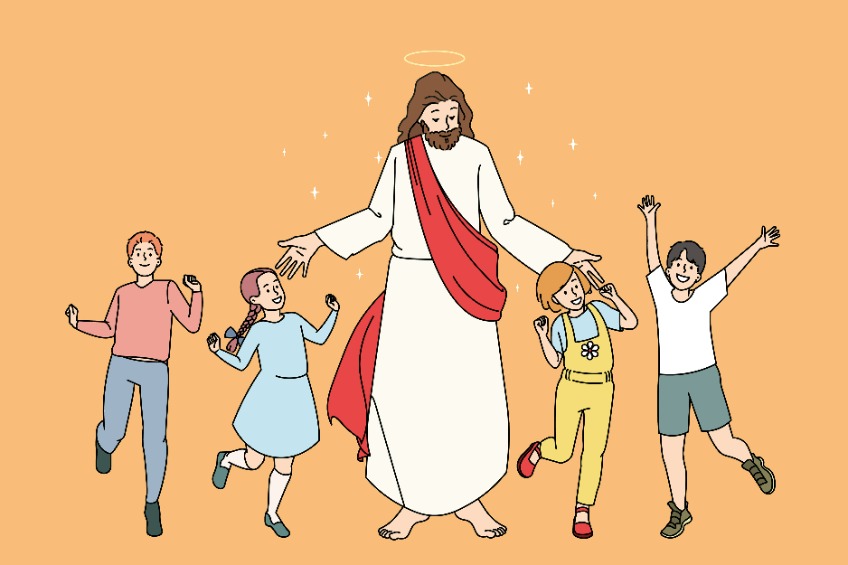
No, the priest did not talk about Bingo. But he did concur with many modern theologians who point to Jesus as the 8th sacrament – “an outward sign, instituted by Christ, to give grace.” The person of Jesus is the ultimate outward sign of God’s grace. Jesus shows us close up God’s love and mercy, God’s guidance and compassion. Indeed, Jesus is the very embodiment of grace in action, grace lived day-by-day in the world.
And what about a 9th sacrament?
Well, say many theologians, the 9th sacrament is “we,” we Catholics / Christians, all the people of God! After all, isn’t each one of us commissioned by our baptism to be living, breathing signs of God’s grace in the world? As St Teresa of Avila says,
“Christ has no body now on earth but yours, no hands, no feet but yours. Your are the eyes with which Christ looks out his compassion to the world. Yours are the feet with which he is to go about doing good. Your are the hands with which he is to bless us now.”
Author William J. Toms sums it up succinctly:
“Be careful how you live. You may be the only Bible some person ever reads.”
Pretty tall assignment – WE as sacrament. And my goodness, does our world need God’s grace! How can we live up to this task of being Jesus’ disciples?
Remember how I mentioned the importance having the “proper tools” for the job at hand? If we are the hands of feet of Jesus, if we are to make real the Gospel to those we meet, if we are a sacrament, then we must be equipped with the basic tools we need to share God’s grace. What are those necessary tools?
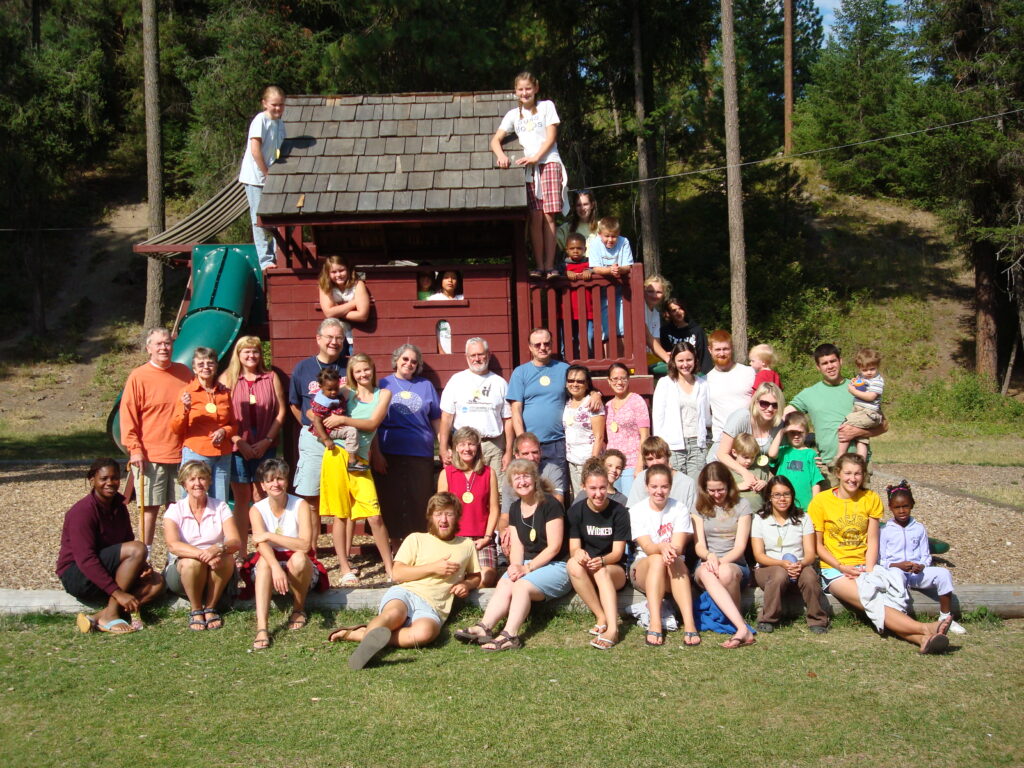
For a start, I propose these: openness, listening, and courage.
Openness – Can I be open to and in awe of our loving God; open to the promptings of the Holy Spirit; open to the dignity and marvel of God’s presence in each person I meet; open to the grandeur and wonder of nature, God’s creation?
Listening – Can I listen to the “still, small voice” of God in my prayer, learning from God’s directions and encouragement? Then can I bring that listening attitude to each person I meet?
Courage – Do I have the courage to believe that I am God’s ambassador in the world? Can I share my story, mainly by how I live my life, and when appropriate, through words?
Developing these tools of discipleship is a lifelong process. Our sphere of influence in bringing Christ to the world may seem very small. But each of us is important; in fact, each of us plays a vital role in bringing God’s message of love and forgiveness to the world. As Mother Teresa said, “Small things done with great love will change the world.” God wants to use us to spread grace and is just waiting for our “yes.” How will you be a sacrament today?
Homespun Homily: Being a power for good with my limitations and diminishments
By Lori Fontana
We’re all on the road “home” to God. We all want to get to heaven…though not today, Lord. But we’re not just in a holding pattern here. What are we doing “while we wait” for entrance into our eternal home? The chorus from a 60’s church song contains my two main thoughts:
Love one another; love one another, as I have loved you.
Care for each other; care for each other, as I have cared for you.
And bear one another’s burdens, and share each other’s joys.
Love one another; love one another, and bring each other home.
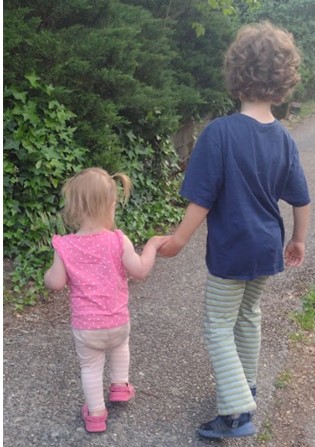
First, I recognize and embrace that I am a beloved child of God; and in this love, God gives me gifts and talents. None of us has ALL the gifts, nor are our gifts perfect; but each gift is valuable. It’s important that I not measure my worth according to a false hierarchy of gifts. When St Paul talks about the parts of the body, each part has a different function, but all parts are valued and needed. 1 Corinthians 12: 14 – 22
Secondly, who I am and the gifts I have – these are meant for me and for others, for the community. The Christian life is not just God and me.
The Christian life is a shared life. All love, including God’s love, is made real in the giving and the receiving. In the famous Rublev Trinity icon, the figures representing God the Father, God the Son – Jesus, and God the Holy Spirit are arranged in a circle, acknowledging each other. They are depicted in relationship with each other!
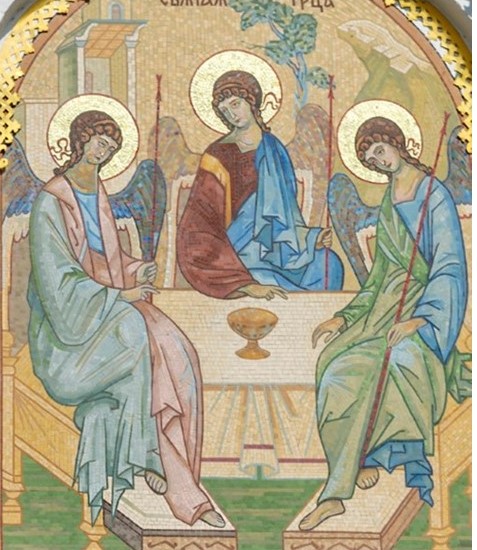
Each of us is created and loved by God. But from the moment we are born, we are diminishing, whether through illness or injury, external calamities such as job loss or natural disasters, or simply by aging. Where do we draw purpose and hope in light of diminishment? St. Paul offers a hopeful message: that even while we may appear to be “wasting away,” we are growing closer to our eternal glory in God. But we’re not called to retreat to a private corner and waste away. In the time we are given here, we are called to use our gifts to build up the reign of God, to be a power for good in the world. 2 Corinthians 4:7 – 10, 16 – 18
Our Catholic tradition offers the saints, people who, even though suffering limitations, were a power for good. Plus, there are saintly people all around us – “saints-in-the-making.” Here are a few examples.
Sr. Thea Bowman was an African American woman, born in rural Mississippi in the 1930’s. Hers was a loving family, but being a woman and an African American, in the rural south – these were challenges. Taught by Franciscan sisters, she was inspired to join their convent in Wisconsin – a group of all white women, some of whom had never seen a black person. Sr. Thea’s strong confidence in God’s love and purpose for her life carried her forward. She was a natural teacher, using all the gifts of her black Christian culture – song, dance, a deep faith honed through persecution – to guide her students. Until the end of her 50-some years of life, she remained hope-filled and faith-filled until finally succumbing to a painful cancer. In the midst of her illness, Sr. Thea famously said: “Part of my approach to my illness has been to say I want to choose life. I want to keep going. I want to live fully until I die.” Sr. Thea – a power for good!
My mom just turned 93 which brings with it the diminishment of physical and mental abilities and energy. In Mount St Vincent assisted living, she is welcoming and kind to everyone, a “missionary” for the love of Jesus. Though hard of hearing most of her life, she is otherwise quite healthy and gets up each morning with purpose. Even though she is shy, she reaches out to the people around her because she knows the challenges people face when moving into assisted living, and she wants to help. My mom – a power for good!
Joey K – Our friend Joey is a young adult who has Downs Syndrome. Some might say Joey has a difficult challenge. However, Joey doesn’t see it that way. He lives a full, successful life, energized by his desire to help – in his family, community, church, and workplace. From a very young age, he visited the elderly with his family. Now, Joey works at the retirement home. He does his job with great love and care, and he is a friend to all! Outside of work, Joey is a lead usher at Our Lady of Guadalupe Parish, and he always serves at funeral Masses. He is a member of the board of directors for the local Downs Syndrome Community organization. Joey is positive, outgoing, generous in sharing his gifts, and confident that he is loved by God. In that confidence, he loves others. He recognizes others’ gifts and draws them out. Joey – a power for good!
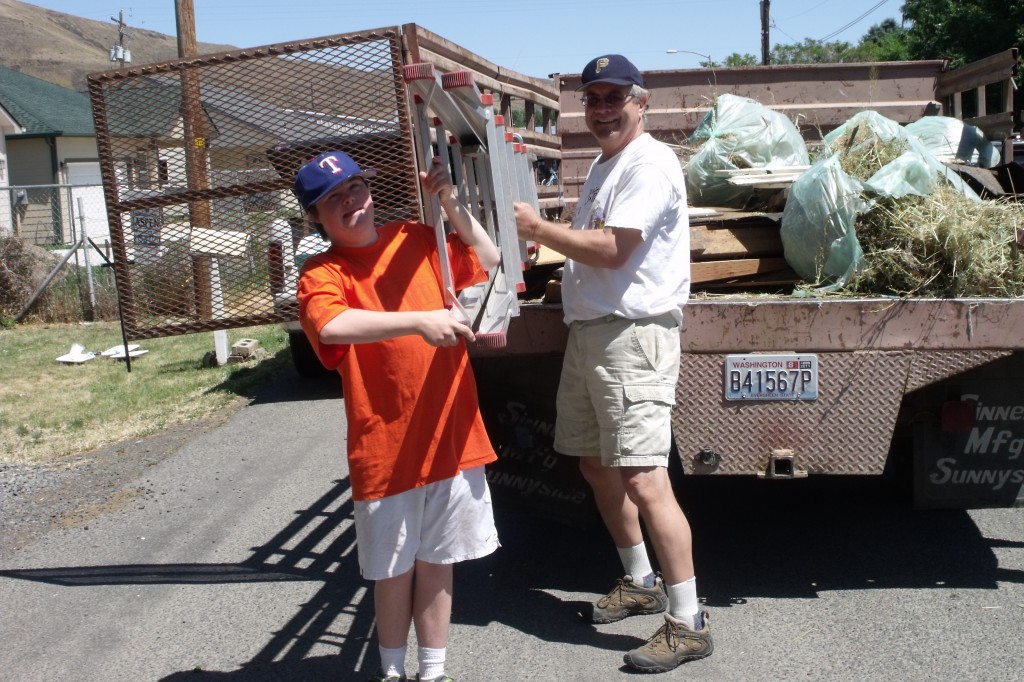
Each of you, I’m sure, knows many folks who, though dealing with their own challenges, use their gifts to help others. Each is a power for God’s goodness in the world. Every one of us is called to be a power for good. Even while, as St Paul says, we are “wasting away” in this life, we can be the hands and feet, heart and voice of Jesus in our world, as our own circumstances allow. We can be a power for good within the providence of our everyday life. What we do and how we do it will look different for each person; but we all can do something!
Mother Teresa encourages us with, “Not all of us can do great things, but we can do small things with great love.” And as Erma Bombeck, an author, humorist and devout Catholic, said:
“When I stand before God at the end of my life, I would hope that I would not have a single bit of talent left, and could say, ‘I used everything you gave me.’”
That’s being a power for good!
Prayer of the Heart
By Robert Fontana
The Greek Orthodox teach that the “heart of God” is anchored in the human heart because the human person is made in God’s image and likeness. The most ancient dwelling place for God in history is not the Ark of the Covenant (with the 10 commandments), not the temple in Jerusalem and not even in the Catholic tabernacle where the Eucharist is reserved. God dwells most intimately in God’s creation, especially in every woman and man because we are made in God’s image and likeness:
Then God said: Let us make human beings in our image, after our likeness. God created mankind in his image; in the image of God he created them; male and female he created them. Genesis 1:26-27

St. Paul agrees:
Do you not know that your bodies are temples of the Holy Spirit, who is in you, whom you have received from God? 1 Cor 6:19
Catholic teaching affirms this.
The desire for God is written in the human heart, because man [and woman are] created by God and for God, and God never ceases to draw [them] to himself. Catechism of the Catholic Church, Art. 27
Deep within his conscience man discovers a law which he has not laid upon himself but which he must obey. Its voice, ever calling him to love and to do what is good and to avoid evil, sounds in his heart at the right moment…. For man has in his heart a law inscribed by God…. His conscience is man’s most secret core and his sanctuary. There he is alone with God whose voice echoes in his depths. Catechism of the Catholic Church Art. 1776
The pathway to the heart of God is the human heart. Each is connected to the other. Every human being regardless of race, creed, color, sexual orientation, or political persuasion has a direct relationship with God “whose voice echoes in his/her depths.” And the fundamental truth that God speaks to every human being from the moment of conception until old age and death is, “My beloved child, I love you. Abide in me as I abide in you.” (John 15:4 adapted)
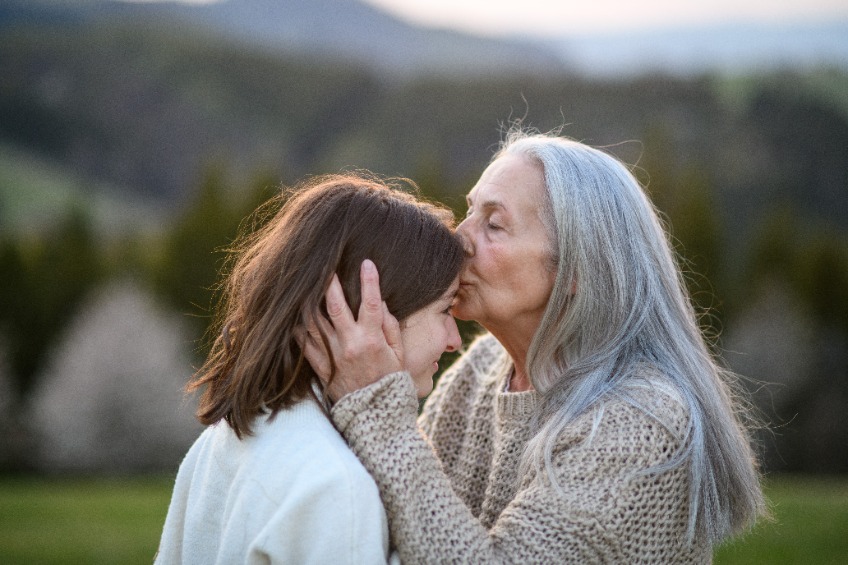
Of course, we humans have not abided in God. We all know the story of sin in the world and sin in our own hearts. We have been raised in our own family and in a Church community which have struggled to help us know our deepest identity in God. But childhood wounds, personal traumas, poor choices, addictions, and corruption in the Church and society have caused us to forget our deepest identity. We see this echoed so beautifully in the story of Zacchaeus the Jewish tax collector. (See Luke 19:1-10)
Zacchaeus is a Jewish man who, through his collaboration with the Romans as their tax collector, has forgotten his roots. He is a crook who has robbed his own people for material gain and has worked his way up to the top of his profession as the chief tax collector. Yet he is unhappy. He wants to see Jesus and so climbs a tree and gets into a place where he can see Jesus clearly. And when he does, Jesus calls out to him and says, “Zacchaeus, come down immediately. I must stay at your house today.”
Zacchaeus comes down with joy. He is already a changed person. The crowds, meanwhile, get angry at Jesus for staying at the house of a sinner. Jesus has never called Zacchaeus a sinner. He has never said to him, “Repent from your crimes, and get on your knees, and beg forgiveness from God and the people you have robbed.” All we know is that Jesus took the initiative to be with Zacchaeus and dine with him. Zacchaeus, for his part, shows that he has changed:
I give half of my possessions to the poor, and if I have cheated anybody out of anything, I will pay back four times the amount.
Wow! Jesus is impressed. He realizes that Zacchaeus now remembers who he is, where his deepest identity lies. It is not in being a tax collector, a rich and powerful man of the world. What does Jesus say?
Today salvation has come to this house, because this man, too, is a son of Abraham.
Jesus is the incarnation of God’s love. Whatever is in the heart of God is enfleshed in the person of Jesus. To encounter Jesus is to begin the process of rediscovering the deepest truth about oneself by hearing the voice of God say:
“My beloved child, I love you. Abide in me as I abide in you.”
What is the path of prayer to “abide with God?” It is the prayer of the heart, prayer that lets go of words, mental examinations, even imaginative play, and is simply being with God in silence and quiet. This is very Biblical:
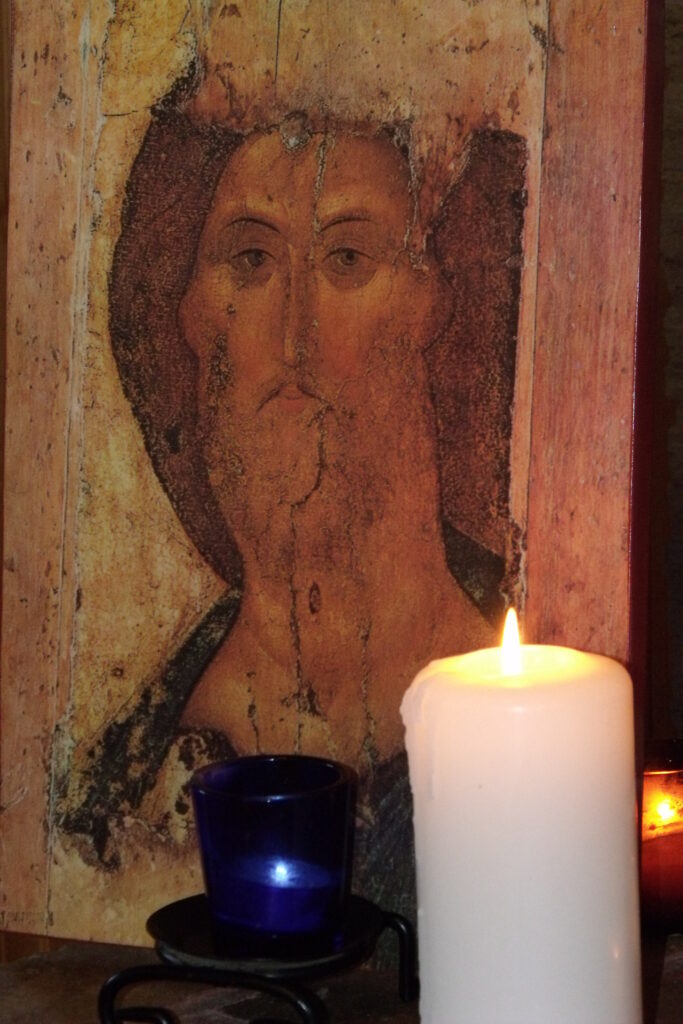
Be still and know that I am God. Psalm 46:10
When you pray, go to your inner room, close the door, and pray to your Father in secret. And your Father who sees in secret will repay you. In praying, do not babble like the pagans, who think that they will be heard because of their many words. Do not be like them. Your Father knows what you need before you ask him. Matthew 6:6-8
Slowly over time, by quieting the active mind, the anxious body, the restless soul, we humans learn to rest in God, to receive God’s love, and to let go of unnecessary attachments, fears, resentments, regrets, shames, and control, and finally find a measure of freedom to oneself in Christ. Joy wells up! Love wells up! Peace wells up! Not always, but most of the time.
Prayer of the heart, is a way of praying for every person, especially those like Zacchaeus who get up every day and go to work, even as a tax collector, to be a power for good, confident in one’s true identity as God’s beloved son or daughter.
Easter/Pentecost: A good time to question your religious, cultural, and personal beliefs and practices
By Robert Fontana
Yes, it is true. This is the good and proper season for questioning one’s belief systems. That’s what Thomas the apostle did after his friends claimed to have seen Jesus, whom Thomas knew was dead. Thomas responded, “Unless I see the mark of the nails in his hands and put my finger into the nail-marks and put my hand into his side, I will not believe.” John 20:25
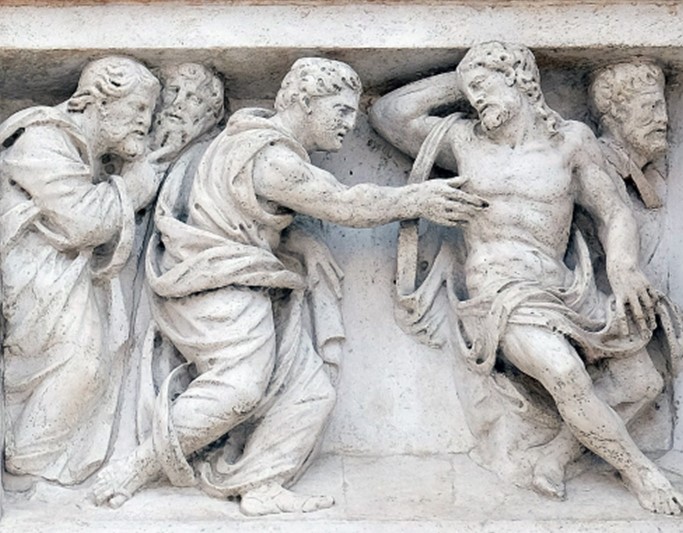
Thomas probably expressed the doubt that some of the others also felt. In fact, Luke’s version does state that all the disciples present were disbelieving in what they were seeing: But they were startled and terrified and thought that they were seeing a ghost. Then he said to them, “Why are you troubled? And why do questions arise in your hearts? Look at my hands and my feet, that it is I myself. Touch me and see, because a ghost does not have flesh and bones as you can see I have.” Luke 24:37-43
Healthy doubting and questioning can lead to greater understanding and conviction. This has been true in my life. For example, in struggling to understand what it means to live as a Catholic Christian in a world with sincere believers of other religions – Protestant, Orthodox, Muslim, Hindu, Buddhist, Native American, and even sincere practitioners of no religion – I have wrestled with: Is my way right and their ways wrong? Can we all be right? Are we all somewhat right and somewhat wrong?
What I came to see through this questioning was that I had a wrong attitude about the non-Christian world. I used to believe that it was completely void of God, and we Catholics and other Christians were bringing God to the world. I was a Catholic fundamentalist, conquering the world for Christ. I was convinced that “the other side” has nothing to offer, that they needed to surrender to my monologue of truth. When I came to see that God’s grace and presence abound in every human person and culture, that I have a truth to share but so do others, then I learned that respect and dialogue had to be at the core of my relationship with them.
Having the courage and skill to question one’s belief system is essential for mature spirituality and responsible engagement in the Church and in civic society today. This is especially true considering the influence of social media and the “either/or thinking” of both the left and the right in today’s Church and society. It also takes into consideration the modern levels of corruption that abound.
Many Catholics would not agree with this statement. Question the Church…or my pastor? Never!
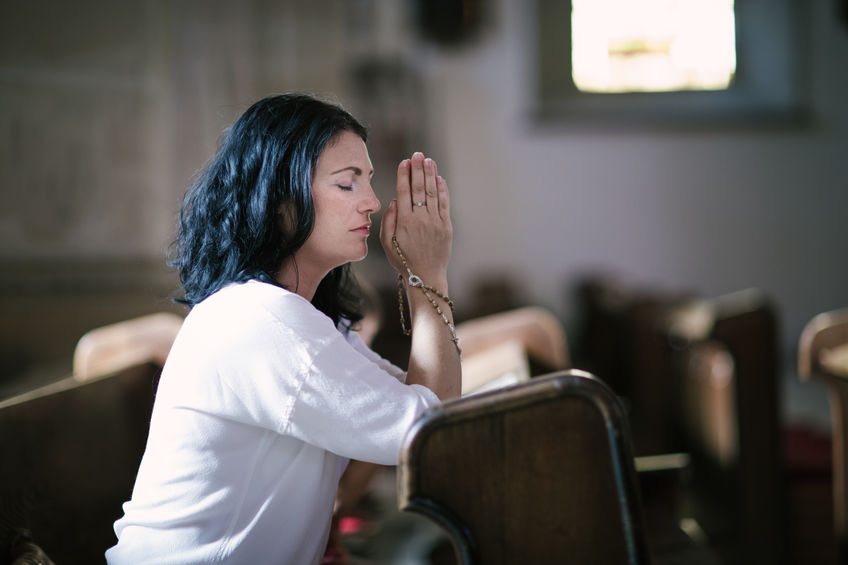
My mother once told me that she tithed weekly to the parish because that was her duty to God. What the pastor did with the money was his duty to God and not her concern. I told my mother that her way of thinking was a recipe for financial mismanagement in the church (she didn’t like hearing that). But apparently the bishops at the Second Vatican Council thought as I did because, although the bishops recommended parish councils in each parish, finance councils were mandated. Leading up to the Vatican Council in 1962, problems with incompetence and actual criminality among managers of the church’s financial resources were acknowledged. Sadly, these problems continue today:
The Michigan priest—pastor of the same parish for 30 years—who was convicted of stealing $573,000…for stock market investments and alcohol; the Philadelphia Archdiocese CFO who embezzled nearly a million dollars (gambling habit); the New York Archdiocese employee who embezzled nearly a million dollars to purchase additions to her expensive doll collection; the Florida monsignor who was accused of stealing as much as $8 million over his 40 years as pastor, [money] …used to purchase real estate and take expensive vacations with his mistress… (https://uscatholic.org/articles/201701/how-to-stop-embezzlement-in-your-parish/)
When it comes to money and management of church assets, the approach the Catholic faithful ought to have towards Catholic leadership who are managing affairs is the same approach that President Regan recommended in dealings with the Soviet Union: “Trust but verify.” But how? Learn about and question all budgets and expenditures and insist on full disclosure.
One of the most frustrating aspects of the clergy sex abuse crisis is that bishops are asking the faithful and the public at large to trust without verification. The first president of the National Review Board (which investigates clergy sex abuse), former Oklahoma governor Frank Keating, lamented that dealing with Cardinal Mahoney of the Los Angeles Diocese was like dealing with the Mafia. (See https://www.ncronline.org/news/accountability/keating-recalls-service-review-board)
Recently a grand jury investigation into the Baltimore Archdiocese disclosed cardinals, archbishops, and diocesan leaders who, for decades, covered up sexual abuse of minors and vulnerable adults and protected the clergy perpetrators of that abuse. Does it take a grand jury investigation in every diocese in the country to get at the truth of clergy sex abuse?
What are you and your parish leaders doing to probe and question your diocese’s handling of cases of sex abuse in the Church?

Probing and questioning my relationship with God, the Church, the USA, and even my family does not mean I do not love God, the Church, the USA, and my family. Probing and questioning of behaviors that seem unhealthy or confusing is what healthy relationships and healthy spirituality in adulthood demand.
Pope Francis clearly thinks this is true. He has challenged us Catholics to question how we welcome migrants in our countries, how we include divorced Catholics and gay and lesbian Catholics in our worship, and how we allow for the greater participation of women in the leadership of Vatican offices, issues not yet anticipated by the bishops at Vatican II.
Easter /Pentecost is a good time to examine and question your religious, cultural, and personal beliefs and practices.
What are some beliefs and practices that you hold dearly, that you get defensive about when others bring them up, that you need to probe and question?
Ask the Holy Spirit to instruct and guide you in the ways you need to mature and grow as an adult in your faith, your culture, and your beliefs.
Poetic Meditations
by Robert Fontana
I have never been one to read poetry. When I do I usually need someone to explain to me what I am reading. There are some exceptions to this. My daughter Mary introduced me to the poems of Mary Oliver. I found them very helpful. Last May I made a men’s wilderness retreat where the retreat leaders relied on poetry to help us understand the points they were trying to make. There efforts worked for me and encouraged me to try my hand at poetry to say more clearly and profoundly what I am experiencing in prayer. Here are a few poems for your Easter/Pentecost meditation:
I HAVE SEEN JESUS
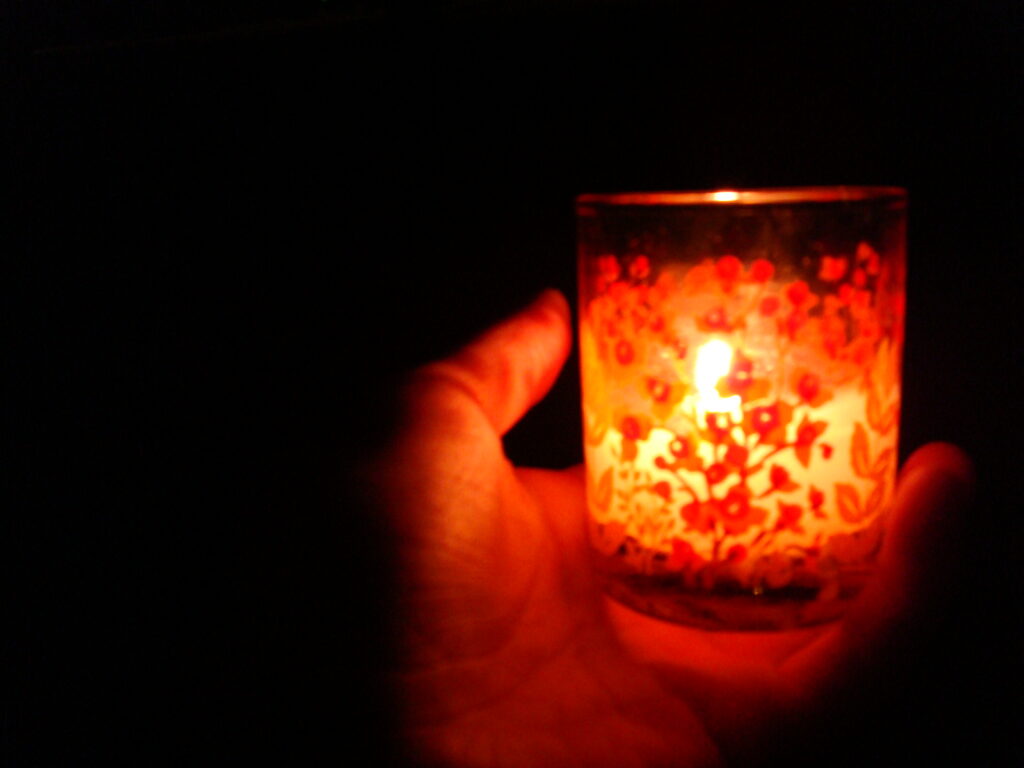
“Although you have not seen him, you love him” 1 Peter 1:8
I have seen Jesus, I have seen him. Oh, not the Jesus in robe and sandals walking along the shores of Lake Galilee. No, not him.
But I have seen the Jesus in my mother and father who worked night and day to feed and clothe their children; in my music teacher practicing, once again, to create a more beautiful sacred song; in the priest who listened to me with great compassion and gave me wisdom instead of reprimand; in my neighbors who gather weekly to feed our struggling neighbors in a pop-up kitchen; and in my elders who bear their aging pains with patience and face their approaching death with hope.
No, the Jesus who walked in history, who opened the eyes of the blind and ate with sinners and tax collectors, him I have not seen. But the risen Jesus alive in his people, that Jesus I have met over and over again. And I “rejoice with indescribable and glorious joy” (1 Peter 1:8) for I love him and he loves me.
FOREST CALLING

Come home, Human, come home. You don’t belong to the concrete, the noise, the buying and selling, the endless arguing, the despair, the fleeing from life.
No, that is not your home.
You belong here with the symphony of birds, with the gentle wind and soft rain, with the towering trees and lush ferns.
This is your true home, Human, where waters flow, trees grow, flowers bloom, squirrels play, children run, lovers walk, and elders listen.
Come home, Human, come home to the forest where you will find rest, acceptance, and a healing place to unlock your caged mind and heart, and be free.
TRINITY

Draw me into the warmth of your circle, O Trinity. Draw me into the intimacy of your sharing, singing, laughing, silence, and tears.
Draw me close, Abba, Jesus, Spirit. Draw me and all whom I love.
You do draw me into your inner circle, into your communion of life and love. You do enclose me in your friendship, trust, vulnerability, truth, and wildness of heart.
Holy Trinity, Great Mystery, Love Divine, cosmic and earthy, I sit in wonder and awe before your presence. Draw me close to you that I might be set free from what does not matter and set afire for all that does.
Are you an adult child of an alcoholic-angry-dysfunctional parent? There’s hope!

Dear Readers, I asked a friend to write about his experience as an adult child of an alcoholic. What he writes about applies to any relationship with a parent who created a home environment of emotional unpredictability, secrecy, and/or shame.
Hi. I’m Tim and I am the adult child of an alcoholic. This is how you introduce yourself at a meeting of Adult Children of Alcoholics (ACA). If it sounds familiar, it is. ACA is a 12-step program similar to AA, but intended for those who were raised in alcoholic or otherwise dysfunctional families. In my case, my mother was the alcoholic, but possibly more importantly my dad was an emotionally distant workaholic. A lot of his dysfunction was no doubt adaptive behavior from dealing with my mom’s addictions.
The name of the program is significant. It is not just simply that as a child you had an alcoholic parent and now you are an adult. Part of this condition is understanding that because you were inadequately parented as a child, you may be ‘stuck’ in some ways, hence becoming an ‘adult child’. The ACA recovery can apply to anyone who had a childhood where there was anger, neglect, dysfunction, abuse, or other addictions.
Core to the ACA journey to recovery is “Becoming Your Own Loving Parent”. The program encourages that you identify within yourself 4 voices or personas: Loving Inner Parent, Critical Parent, Inner Teen, and Inner Child. Adult children acknowledge that their biological parents were unable to parent in a loving, supportive way that allows for healthy emotional development.
The Loving Inner Parent can provide the acceptance and emotional support that we didn’t receive as children. The Critical Parent is the voice of shame. The Inner Teen and Inner Child represent the voices of various points of our childhood. Because of the dysfunctional parenting we received, there are parts of ourselves that are ‘stuck’ in childhood. The process of self-parenting is intended to heal the inner child and protect us against the Critical Parent.
I have only been following this path to recovery for several months. Like many of these journeys, it began with a crisis. Mine was dealing with crippling anxiety. My anxiety meant that weeks before what should be fun events, I would be so consumed with worrying about possible bad outcomes that by the time the event came, I would just be so glad to be done with it that I could find no joy in it. In seeking therapy, I learned that many ACA deal with anxiety. Our childhood experience of never knowing what family crisis would erupt leaves the impact of always being on guard and hypervigilant.
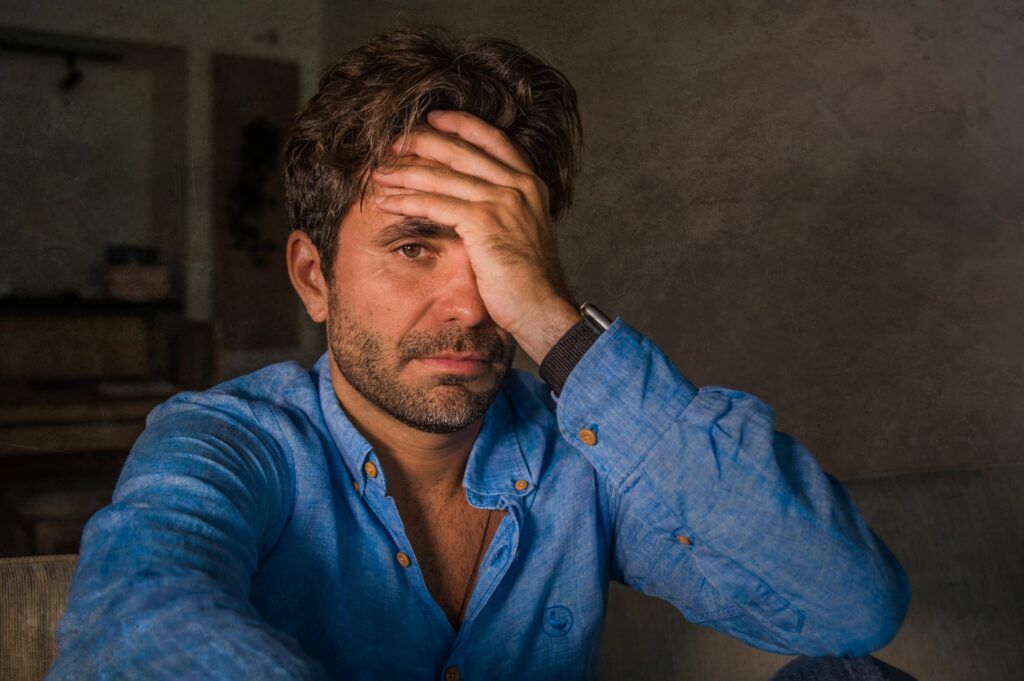
It is likely obvious that both the trauma of dysfunctional parenting as well as the journey to recovery have spiritual implications. Here are a few that I have found:
- Many of the steps in a 12-step program are about surrendering to pain in search of healing. We can’t begin to heal without accepting the nature of our condition, accepting that our parents failed us in some way, and acknowledging and making amends for our faults. To me, it follows the redemptive healing that Jesus accomplished in surrendering and accepting the suffering of the Cross for us.
- One fundamental lesson of ACA is how to love ourselves. Many adult children were not taught this by their parents due to their own illness. They heard instead that ‘they were in the way’, or possibly that the parent’s addiction was more important to them than their child. Our Loving Inner Parent teaches what the Gospel teaches: we are each worthy of love simply by being a human. In the same way that we can’t earn God’s love (or lose it), we have to be willing and ready to love ourselves. When I am anxious, my Inner Parent reminds me that God loves me, cares for me, and that all will be well.
- There is strength in community. When I hear the stories that other adult children share, I am really struck by the way that so many wounded souls walk among us. Like our faith journey, the path to recovery is an easier one in the company of ‘fellow travelers’. Even those who were not raised in dysfunctional families need to cope with the trauma of original sin. All souls are wounded and in need of compassionate, loving support. We see in both our faith communities and in communities of recovery Jesus’ loving presence in those around us.
The 12-steps traditions have variations of “The Serenity Prayer”. ACA’s version is “God, grant me the serenity to accept the people I cannot change, the strength to change the one I can, and the wisdom to know that one is me.” ACA tend to be overly responsible, wanting to ‘fix’ or ‘save’ anyone in their lives that they sense needs it. This prayer teaches that the only one I can save is myself. With God’s help, I can reparent myself to let the healing begin.
If any of this applies to your childhood, consider attending a meeting. Most are available on-line (thanks, Covid!). They are very easy to quietly attend in order to become familiar with what the program offers. To learn more or find a meeting, see https://adultchildren.org/.
Homespun Homily: Tulips and the Resurrection – Easter 2023
By Lori Fontana

You know about tulips. I think they are my favorite flower. Each fall, around early September, I buy or pull out of the storage shed the oddly shaped, gnarled orbs we call bulbs. They look dry and lifeless, with loose peelings of brown skin and sometimes a tuft of short, dark root tendrils. I loosen the soil in our garden, dig little circular tunnels straight down, and, one-by-one, place the bulbs inside. As I smooth dirt over each bulb, I wonder – what will this one look like? What color will it be? Because, usually, I have no idea which bulb is which, which is red or pink, white or purple – it will be a great surprise come the spring.
Then, with great hope, I wait…and wait…and wait.
The bulbs are out of sight, hidden in the earth. Through the fall and winter, they are covered over with fallen leaves, puddles of rain, a smattering of snow.
The winter months are so dark, so gray, so wet. It’s hard to remember the promise of colorful blooms. Our Seattle spring comes very slowly. We might have one sunny day in January; maybe one more in February. By March the sun might shine once a week. Yet the air is still damp and icy cold. But the tulips respond to the slightest touch of sunshine warmth. Forgotten over the long winter, each bulb now stretches the tiny tip of a green leaf through the soil and into the weak sunlight of early spring.
At first, I hardly notice that the garden is coming alive. But then the tip of the leaf pushes further up; one leaf, then two and three. And nestled between them is the flower stem with the tightly closed bloom perched on top. The tulips grow at their own pace; and they keep their blooms securely under wraps until they reach full height. Only then do the buds begin to unfurl, showing the glorious colors of their delicate petals, some rounded, some pointed, some ruffled or scalloped. The petals are bright and luminous, catching the breeze and waving and bowing in the sunlight. What a wonderful spring surprise!
It’s very fitting that we observe Holy Week in the spring. As we approach Holy Week – the Passion, Death, and Resurrection of Jesus – I think tulips are a gentle reminder of the desolation and the glory of this painful, wonderful, awesome mystery. On the cross, Jesus gives his final gift. Through his passion and death, Jesus pours out his life in great love for us. At the end, he has nothing left to give – he’s given us his all. Taken down from the cross, Jesus is placed in the tomb, his tortured body hidden away in darkness, out of sight. His followers are left alone, bereft and drained of hope.
Symbolically, for Jesus’ followers, it’s winter in their hearts and souls: Jesus, whom the disciples believed was the Messiah, their friend and teacher whom they loved, is now lifeless, gone from their sight. All is hopelessness. The disciples cower behind closed doors, filled with doubt and fear. Quickly forgotten is the Jesus who turned water into wine, who multiplied loaves and fishes, who healed the blind and the lame, comforted the mourning, gathered the children in his arms, and raised Lazarus from the dead.
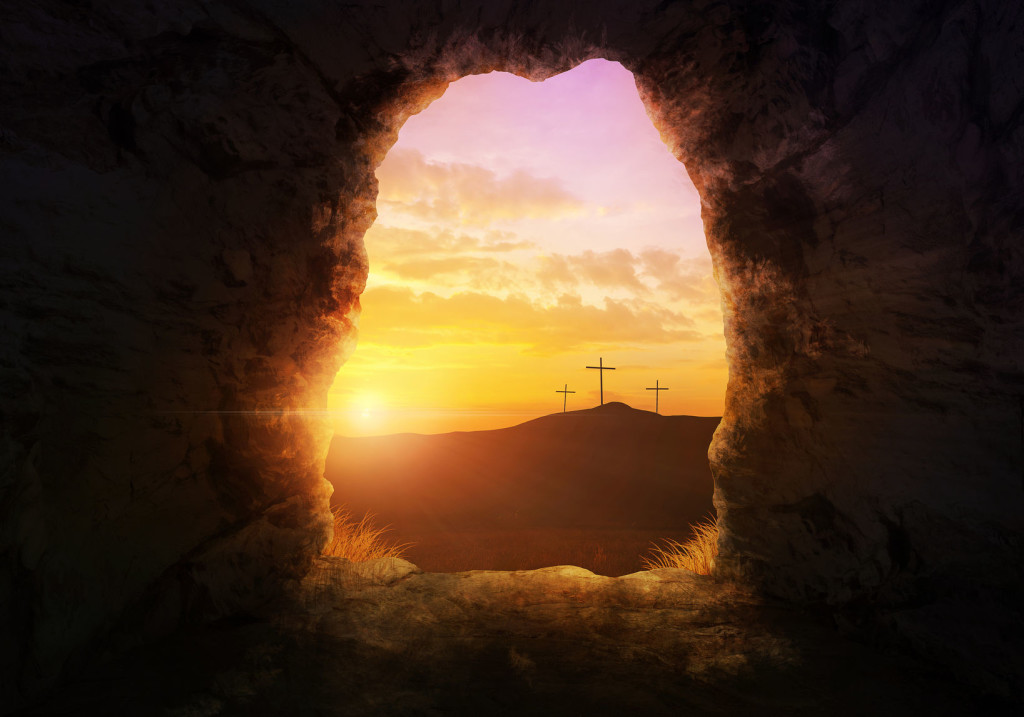
Then comes Sunday morning. Mary Magdalen and her companions come to the garden, intending to anoint Jesus’ body. The first rays of the rising sun warm their faces as they approach the tomb where Jesus lies. And then, wonder of wonders! “An angel of the Lord…[had] rolled back the stone.” To the women, the angel says, “He is not here, for he has been raised just s he said.” Matthew 28:2, 5-6
Jesus appears to Mary Magdalen and others of his disciples. Over the next several weeks, Jesus appears to many believers and doubters alike. With the resurrection, many renew their faith in Jesus; many others come to believe. What was lost is found; what was hidden is now seen; what was dead is now alive!
In a very humble way, the tulip mirrors the Resurrection. The tulip bulb appears dead. It’s hidden away in the cold earth. In fact, it must lie buried in winter’s cold so that it can “rise” to new life in the spring. A small miracle: from the bulb which, when planted, appears to be wrapped in a drab burial cloth, bursts forth a magnificent flower rich with color and life.
From death to life! The miracle of the Resurrection. As we travel with Jesus through Palm Sunday to the Last Supper of Holy Thursday, to the Agony in the Garden, through Jesus’ trial and torture, his Way of the Cross, his crucifixion on Calvary’s hill, his death and burial – cling to sure hope. Jesus’ burial in the dark tomb is not the final word. Easter morn will dawn, and with it the glory and colors of NEW LIFE. When you see tulips blooming in gardens and on Easter dinner tables, remember that death is not the end. For we who believe, it is the path to new life. What appears dead has new life in the promise of Jesus.
The lesson of the tulip is echoed in a line by Martin Luther, the great Protestant Reformer:
“Our Lord has written the promise of resurrection, not in books alone, but in every leaf in springtime.”
Happy Easter!

Young people, will you succeed as spouses and parents? (Part II)
(An imaginary conversation between Robert and young adults in college, some churchgoers and some not. In Part I, young people talked about the impact of being raised in divorced families and expressed their desire to avoid divorce in their futures.)
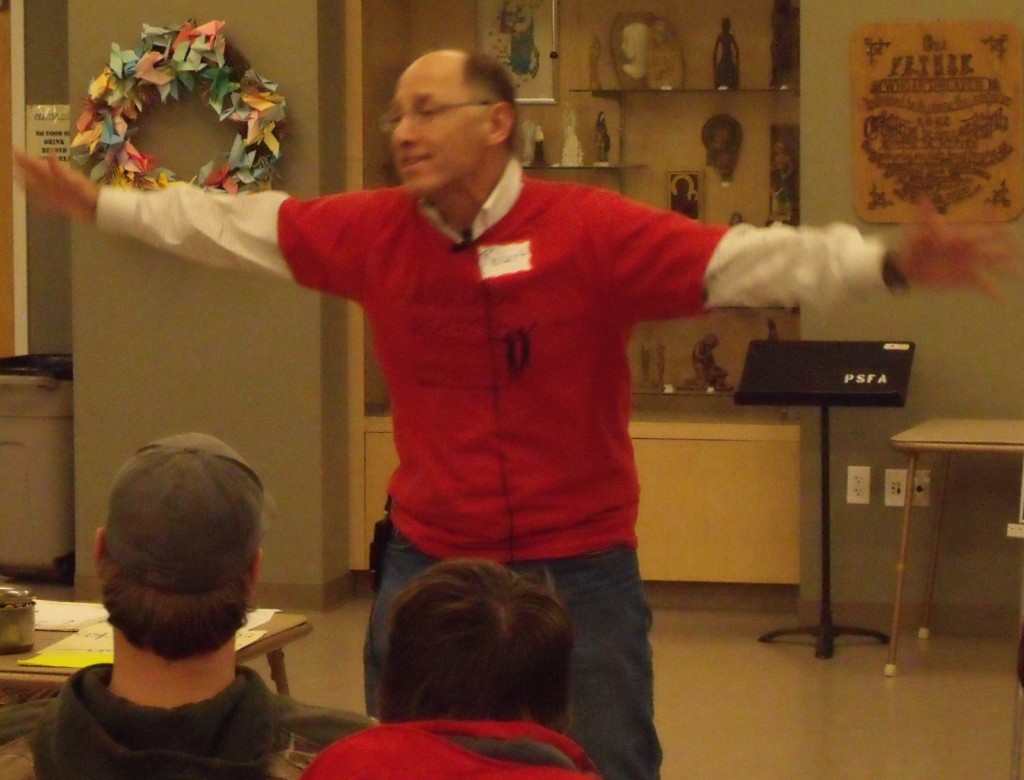
Robert It’s not too late for you to prepare now to be successful later as spouses and parents. Think about it. What preparations can you do now to help you succeed later in love/marriage and as a parent?
YP1 Don’t marry a jerk! (Others yell out, “Yeah, don’t hook up with an a_ _ h_ _ _ !”)
R Amen to that! But keep in mind that your moms and dads did not think the other was a jerk at the time they married. Maybe there were signs of problems that lay ahead that each ignored because they wanted so much to marry and did not want to have an argument.
YP1 My mom told me that she swore as a teenager that she would never marry a drunk like her own dad. But she did. She thought a baby and marriage would change Dad. It didn’t. She did everything to try to get him to sober up and be a good dad. He was a good dad when he was sober.
R Thank you for saying that. There’s so much pain in your story. It’s sad but true: men and women raised in families who struggle with drug or alcohol addiction often marry a partner who has some sort of substance dependency. If your boyfriend or girlfriend has a regular pattern of getting drunk or stoned now, marriage and parenthood are not likely to change that. The same is true if he or she treats you really badly when there’s a conflict – name-calling or a prolonged “silent treatment,” throwing things, etc. Moving in together, buying a house together, having a baby together and/or getting married will not usually change that behavior.
YP2 My girlfriend wasn’t a jerk; we just couldn’t get along after moving in together. She didn’t like how I stayed up late gaming; I didn’t like how messy she was. She didn’t like my work hours, and I didn’t like how she wouldn’t talk to me when she was mad. So, we broke up.
R Too bad you broke up.
YP2 What? How can you say that?
R Well, from what you told me, the two of you were learning some important things about each other. You were learning how different each was from the other. You just didn’t learn how to accommodate your differences so that the relationship could survive and thrive.
YP2 We were like two people playing tug-of-war.

R Many of your parents who divorced probably started growing apart for the same reasons. They were bumping into each other’s differences, which resulted in conflicts that they never learned to resolve. They didn’t have the tools to work through their differences. You see, you and your girlfriend had an unsolvable problem, as does every couple in the universe. You are not your girlfriend, and your girlfriend is not you!
It’s been documented by exhaustive research that 70% of all conflict between a couple has little to do with big moral issues such as, “Are we going to cheat on our income taxes this year?” or, “Shall we trash the neighbors’ yard?” Most conflict between two people in love comes from their having different histories and life experiences, different emotional temperaments and communication skills, and different expectations of the relationship. And when they bump into these differences, they don’t know how to negotiate them and find some common ground so that the relationship wins.
YP3 What do you mean by “the relationship wins?” Doing whatever my partner wants so that we don’t have a conflict? Dad tried that. “Happy wife, happy life,” he would say. That worked for a while. Then a little thing would set him off, and he would explode with anger.
R Great question. Denying my needs in this relationship and giving in to my partner’s is a recipe for my feeling hurt, unimportant, and resentful. For “the relationship to win,” we both have to make our emotional needs clear on any particular issue and work for common ground where we both get something we need. In my own marriage, when my wife and I each learned to say, “I won’t win at your expense, and I won’t let you win at my expense,” we began learning to resolve our differences. The relationship “won” because we were learning to trust that we had each other’s best interests at heart.
Now this may seem a bit odd to you all, but what we really learned was to seek “unity” in all things. By seeking “unity in all things,” in how we spent money, with cooking, work commitments, time together and time apart, we were able to resolve one potential conflict after another. Unity doesn’t mean “uniformity.” I will never be my wife, and she will never be me. After 45 years of marriage, we are still night and day different in many aspects of our personalities.
YP4 That sounds beautiful…and impossible.
R It is beautiful, and it is hard…and it is possible! Think about this. You are training right now to succeed in a particular career or area of work. You are not learning everything you need to know to succeed in these occupations, but you are laying a foundation on which you can build as you grow into your career. Can you also intentionally practice skills now which will help you succeed later in marriage? Since time is almost up, let me give you a list of skills you can develop now to succeed later as spouses and parents.

- Learn to grow in self-awareness. Take time each day learn about yourself, what you like and dislike, and why. Journal your thoughts. Pay attention especially to times when you have been hurt by another or when you have reacted strongly to another. Examine why you responded the way you did.
- Learn to listen to others for understanding. Work at listening without the motives of winning an argument, rebutting the speaker, or proving the speaker wrong. Especially with others with whom you may not have much in common, practice listening for the purpose of understanding. Remember, you can understand someone even if you don’t agree with what he / she is saying.
- Learn to validate another’s emotions. This is part of listening. Look for the emotions/ feelings behind the words. This is important because emotions drive behavior. By naming the feelings that are being expressed, the listener can convey care and a deeper understanding of the speaker.
- Learn to grow in friendship (especially with a romantic partner). Learn to share your likes and dislikes with trusted friends; and listen to their likes and dislikes. Identify how you are similar and dissimilar. Practice finding common ground. (By the way, friendship between spouses is one of the key ingredients for a lifelong successful relationship.)
- Learn to resolve conflict by seeking common ground and unity with another person.
- Learn to forgive and ask for forgiveness. There are no perfect relationships. We do hurt one another despite our best intentions. Sometimes forgiveness is what’s needed to heal and move forward in a relationship.